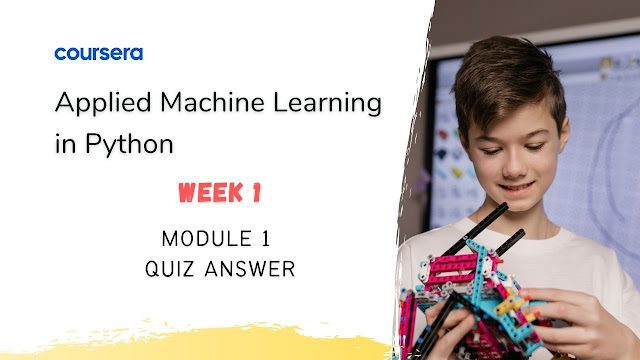Applied Machine Learning in Python Module 1 Quiz Answer
Hello Friends in this article i am gone to share Applied Machine Learning in Python Coursera Module 1 Quiz Answers with you..
Applied Machine Learning in Python Quiz Answer
Also visit this link: Applied Machine Learning in Python Module 4 Quiz Answer
Module 1 Quiz Answer
Question 1) Select the option that correctly completes the sentence:
Training a model using labeled data and using this model to predict the labels for new data is known as ___________.
- Supervised Learning
- Density Estimation
- Clustering
- Unsupervised Learning
Question 2) Select the option that correctly completes the sentence:
Modeling the features of an unlabeled dataset to find hidden structure is known as _________.
- Supervised Learning
- Regression
- Unsupervised Learning
- Classification
Question 3) Select the option that correctly completes the sentence:
Training a model using categorically labelled data to predict labels for new data is known as _________.
- Regression
- Clustering
- Classification
- Feature Extraction
Question 4) Select the option that correctly completes the sentence:
Training a model using labelled data where the labels are continuous quantities to predict labels for new data is known as _________.
- Feature Extraction
- Regression
- Classification
- Clustering
Question 5) Using the data for classes 0, 1, and 2 plotted below, what class
would a KNeighborsClassifier classify the new point as for k = 1 and k=3?
• k=1: Class 1
• k=3: Class 2
Question 6) Which of the following is true for the nearest neighbor classifier (Select all that apply):
- A higher value of k leads to a more complex decision boundary
- Partitions observations into k clusters where each observation belongs to the cluster with the nearest mean
- Memorizes the entire training set
- Given a data instance to classify, computes the probability of each possible class using a statistical model of the input features
Question 7) Why is it important to examine your dataset as a first step in applying machine learning? (Select all that apply):
- See what type of cleaning or preprocessing still needs to be done
- You might notice missing data
- Gain insight on what machine learning model might be appropriate, if any
- Get a sense for how difficult the problem might be
- It is not important
Question 8) The key purpose of splitting the dataset into training and test sets is:
- To estimate how well the learned model will generalize to new data
- To reduce the amount of labelled data needed for evaluating classifier accuracy
- To reduce the number of features we need to consider as input to the learning algorithm
- To speed up the training process
Question 9) The purpose of setting the random_state parameter in train_test_spIit is: (Select all that apply)
- To avoid predictable splitting of the data
- To make experiments easily reproducible by always using the same partitioning of the data
- To avoid bias in data splitting
- To split the data into similar subsets so that bias is not introduced into the final results
Question 10) a dataset with 10,000 observations and 50 features plus one label, what would be the dimensions of X_train, y_train, X_test, and y_test? Assume a train/test split of 75%/25%.
- X_train: (7500, 50)
- y_train: (7500, )
- X_test: (2500, 50)
- y_test: (2500, )


